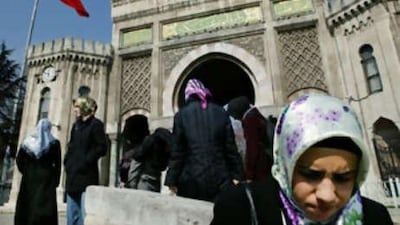ISTANBUL // A month after it narrowly escaped being shut down by the country's highest court, Turkey's governing party is trumpeting its reformist agenda and trying not to provide new political ammunition to critics that accuse it of being an Islamist organisation.
But not everyone is impressed. "We are going through a sensitive period," Recep Tayyip Erdogan, the prime minister, told a closed-door leadership meeting of his Justice and Development Party, or AKP, earlier this month, according to press reports. "Everybody should refrain from words or actions that could raise tensions in the country. Be careful." The Constitutional Court in Ankara ruled on July 30 with 10 votes to one that the AKP had shown Islamist tendencies. Six of the 11 judges called for a ban of the party, only one vote below the threshold for party closures.
The ruling was widely seen as a warning to the AKP to mend its ways and keep away from controversial issues such as allowing female students to wear the Islamic headscarf on university campuses. Hasim Kilic, the chief judge, also called on politicians to ease tensions in society, referring to the conflict between the Kemalist elites, who say they represent the secular heritage of Turkey's founder, Mustafa Kemal Ataturk, and the "Anatolian bourgeoisie", a rising middle class of pious Turks, led by Mr Erdogan.
Although it survived the trial before the Constitutional Court, and possible new legal procedures would have to be based on fresh evidence, the AKP cannot be sure that it is off the hook completely. Sabih Kanadoglu, a former chief prosecutor and leading judicial expert of the Kemalist camp, sent a clear message to the AKP: "It must not be forgotten that this verdict is a last warning to the governing party," he said. If the AKP did not change course, a ban against the party would become "unavoidable", he said.
In an effort to avoid new criticism by the Kemalist opposition, Mr Erdogan stopped a deputy leader of the AKP from tabling a draft law that would have called for the creation of prayer rooms for pupils in state schools. Edibe Sozen, the deputy, shelved her proposal after Mr Erdogan told her to do so. Mr Erdogan's government also presented a new reform package that aims to change 131 laws over the next four years to speed up Turkey's EU bid. The package includes new rules for unions and the judiciary as well as a new asylum law.
Although the AKP has enough deputies in parliament to push most parts of the package through on its own, Ali Babacan, the foreign minister who is also Turkey's chief negotiator in the accession talks with the EU, has been given the task of contacting opposition parties in order to secure a broad consensus. But when it comes to the tension between Kemalists and the "Anatolian bourgeoisie", there is little evidence that the polarisation Mr Kilic wanted politicians to overcome has receded.
"On one side, there is a new religious elite that is conservative and non-western and has formed an alliance with liberals," said Ayse Kadioglu, a sociologist at Istanbul's Sabanci University. "And then there are the secularists, who are allied with nationalists and the army." The two camps are not only separated by politics, but also by vastly different lifestyles. When a rich and pious businessman from Bursa in northwestern Turkey, a typical representative of the "Anatolian bourgeoisie," organised a lavish party in celebration of his son's circumcision last weekend, the daily Hurriyet expressed its surprise at the "new Anatolians" in the headline: "The New Turkey's circumcision party". Pictures showed the businessman and his wife, who wears the headscarf, in front of a helicopter chartered for the occasion. "A new wealthy [social] class is being born in Anatolia," Hurriyet said in an editorial.
At the same time, a new row has broken out between Kemalists and the AKP over alleged efforts by the ruling party to limit the sale of alcohol around the country. Yilmaz Ates, a deputy of the main Kemalist opposition party, the Republican People's Party, or CHP, accused authorities in Kecioren, a district of the capital Ankara, of beating up a shopkeeper for selling alcohol. Kecioren is ruled by the AKP and is also a part of Ankara where Mr Erdogan has a private apartment.
"If the AKP administration can do something like this in the capital of the Turkish Republic, just think of the other provinces, districts and communities," Mr Ates said. Deniz Baykal, the CHP leader, said the AKP "has not drawn the necessary lessons" after the verdict. To show that it understood the court's message, Mr Erdogan should have reshuffled his cabinet and reined in political patronage, but that has not happened, Mr Baykal said.
As a consequence, the CHP is refusing to participate in efforts to make it more difficult for the Constitutional Court to ban political parties. The AKP and Nationalist Movement Party, or MHP, a small opposition party, have signalled they want to amend the Turkish constitution when parliament comes back from its summer break in October. The divide between the CHP on one side and the AKP and the MHP on the other redraws the battle lines between two political fronts that existed shortly before the widely folllowedAKP trial.
The AKP and the MHP, which partly relies on the support of religious voters, co-operated in February in a constitutional amendment that was meant to end the headscarf ban at universities. After the vote in parliament, the CHP took the amendment to the Constitutional Court, which struck down the new law in June, saying it violated the country's principle of secularism. Now the CHP says the other two parties are trying to change the constitution again in order to make a new trial against the AKP impossible.
"We will not be a part of this alliance," said Hakki Suha OK, a deputy leader of the CHP in parliament. @email:tseibert@thenational.ae

